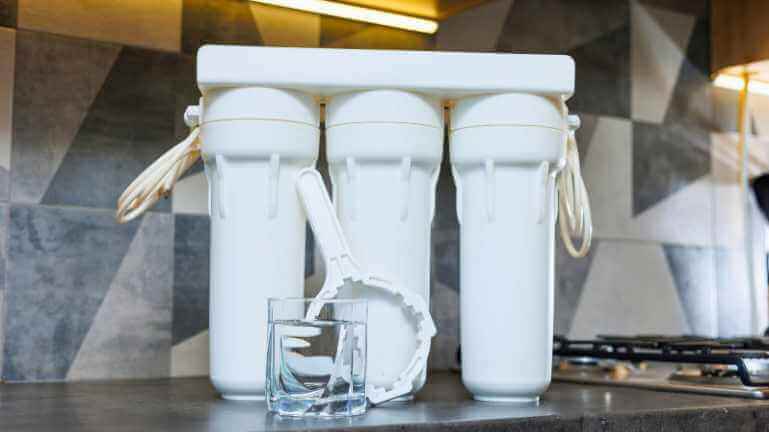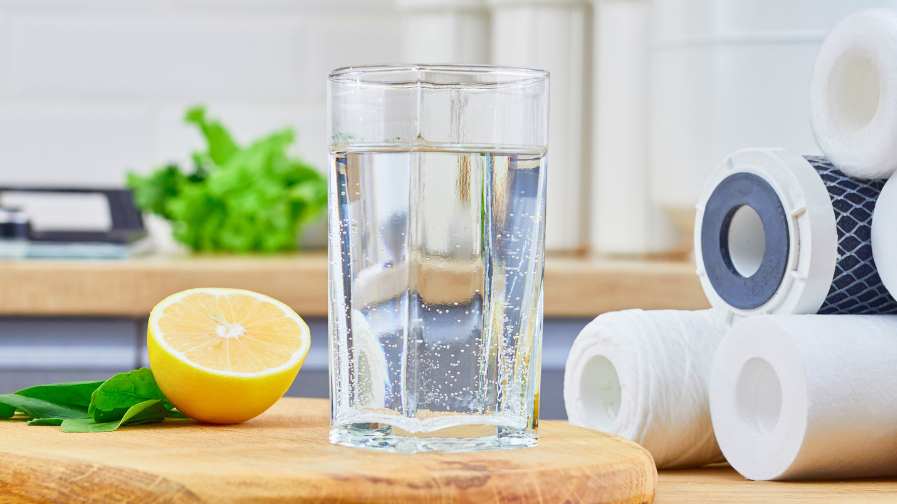Water is an essential element for life, and its quality plays a crucial role in our daily activities.
Whether it’s for drinking, cooking, or washing, we rely on clean and safe water. However, many households face the challenge of dealing with hard water, which contains excessive minerals like calcium and magnesium.
Hard water can lead to various issues, from scale buildup in appliances and plumbing to dry skin and dull hair.
To address these concerns and ensure better water quality, filtration becomes necessary. In this article, we will explore the methods and techniques to filter hard water effectively, ensuring that you and your family have access to clean and softened water for all your needs.
Understanding Hard Water
Hard water is a common water quality issue that affects millions of households worldwide. It is characterized by a high concentration of dissolved minerals, primarily calcium and magnesium ions. When water passes through limestone and chalk deposits in the ground, it picks up these minerals, resulting in hard water. Here are some key points to help you understand hard water better:
| Topic | Information |
| Definition | Hard water is water that contains high levels of dissolved minerals, particularly calcium and magnesium. |
| Prevalence | According to HomeWater 101, 85% of the United States has hard water. |
| Measurement | Hardness is typically measured in parts per million (ppm) of calcium carbonate. |
| Effects | Hard water can cause mineral buildup in pipes, appliances, and fixtures, as well as dry skin and hair. |
| Solutions | Water softeners can remove minerals from hard water, while reverse osmosis and distillation systems can purify water by removing minerals and other contaminants. |
Definition and Characteristics of Hard Water:
- Hard water refers to water that contains a substantial amount of dissolved minerals, particularly calcium and magnesium. These minerals are acquired as water percolates through rock formations that are rich in calcium carbonate and magnesium carbonate.
- One of the defining characteristics of hard water is its tendency to form limescale or mineral deposits. When hard water is heated or evaporates, the minerals precipitate and accumulate as limescale on surfaces like pipes, faucets, and appliances.
- Hard water can interfere with the effectiveness of soaps and detergents, making it difficult to lather and clean effectively. This reduced lathering ability can lead to more soap consumption and less efficient cleaning.
Common Minerals Found in Hard Water: Calcium and Magnesium.
The two primary minerals responsible for water hardness are calcium and magnesium. These minerals are essential for human health and are present in most water sources.
However, when their concentration exceeds a certain level, they contribute to the hardness of the water. Higher levels of these minerals can result in more severe hard water problems.
Impacts of Hard Water
Hard water can have various effects on different aspects of our daily lives. From damaging appliances to affecting personal health, understanding the impacts of hard water is crucial. Let’s delve into the specific areas where hard water can cause noticeable changes:
Effects on Appliances and Plumbing:
Limescale Formation: One of the most significant impacts of hard water is the formation of limescale, or mineral deposits. When hard water is heated, the minerals in it precipitate and form a chalky residue. Over time, this buildup can clog pipes, reduce water flow, and decrease the efficiency of water-using appliances like water heaters, dishwashers, and washing machines.
Reduced Appliance Lifespan: The accumulation of limescale can lead to premature wear and tear on appliances, shortening their lifespan. Appliances operating in hard water tend to require more frequent repairs and replacements, resulting in higher maintenance costs.
Skin and Hair Implications:
Dry and Irritated Skin: Hard water can strip the skin of its natural oils, leading to dryness and irritation. It may cause flaky skin and exacerbate conditions like eczema.
Dull and Brittle Hair: Hard water can leave mineral residues on the hair, making it look dull, flat, and difficult to manage. It can also lead to increased hair breakage and split ends.
Potential Taste and Odor Issues in Drinking Water:
Some people may notice that hard water affects the taste and odor of their drinking water. The presence of minerals and other impurities can impart a slightly metallic or bitter taste, which may not be pleasant for consumption.
Common Hard Water Treatment Methods
Addressing hard water issues requires effective treatment methods that can remove or reduce the mineral content of the water. There are several common methods used for treating hard water, each with its own advantages and disadvantages. Let’s explore some of the most popular hard water treatment methods:
Water Softeners and How They Work
Water softeners are one of the most widely used and effective solutions for treating hard water. These devices work by employing an ion exchange process to remove the calcium and magnesium ions responsible for water hardness.
The water softener contains resin beads coated with sodium ions. As hard water passes through the resin bed, the calcium and magnesium ions in the water are attracted to the resin beads, replacing the sodium ions. The hard minerals are thus trapped on the resin beads, and soft water, now free of calcium and magnesium, flows out for use.
Ion Exchange Process
The ion exchange process in water softeners involves exchanging hardness-causing ions (calcium and magnesium) for softer ions (sodium or potassium). This process effectively softens the water, making it more suitable for everyday use.
Periodically, the resin beads in the water softener become saturated with calcium and magnesium ions, requiring regeneration. During regeneration, the resin bed is flushed with a brine solution containing high concentrations of sodium or potassium ions, displacing the accumulated hardness ions. The wastewater with the displaced hardness ions is then flushed out of the system.
Salt-Based vs. Salt-Free Softeners:
There are two main types of water softeners: salt-based and salt-free softeners.
- Salt-based softeners use the traditional ion exchange process described above and require the periodic addition of salt or potassium to regenerate the resin beads.
- Instead of using salt, some softeners employ methods like template-assisted crystallization or catalytic media, which alter the hard minerals so that they do not create limescale but leave them in the water.
Water Filters Suitable for Hard Water
Water filters play a vital role in improving the quality of water, and they can be valuable additions to combat hard water issues. When it comes to treating hard water, certain types of filters are more effective than others. Let’s explore the different water filters suitable for hard water treatment:
Role of Water Filters in Treating Hard Water:
Water filters are designed to remove various impurities and contaminants from the water, including minerals that cause hardness, such as calcium and magnesium.
While water softeners are specifically tailored to address water hardness through ion exchange, other types of water filters can also contribute to reducing the impact of hard water in different ways.
Types of Filters: Reverse Osmosis, Carbon Filters, etc.
Reverse Osmosis (RO) Filters: RO filters are highly effective in removing a wide range of contaminants, including dissolved minerals like calcium and magnesium. They use a semipermeable membrane to separate impurities from the water, producing soft and purified water.
Carbon Filters: Carbon filters, particularly activated carbon filters, can help reduce the concentration of some minerals present in hard water. They are especially useful in improving taste and odor issues caused by hard water.
Scale Inhibitors: Scale inhibitors are not conventional filters but rather devices that help prevent the formation of limescale. They work by altering the crystal structure of minerals, making it more difficult for them to adhere to surfaces and form scale.
Benefits of Using Specific Filters for Hard Water:

Using filters that are designed to target hard water minerals can lead to various benefits, including:
- Improved water taste and odor
- Reduced limescale buildup in appliances and plumbing
- Softer and more manageable hair and skin
- Enhanced effectiveness of soaps and detergents
Combining multiple filters, such as a water softener and a carbon filter, can provide comprehensive water treatment, addressing both hardness and other impurities.
Whole House Water Filters and Hard Water
Overview of Whole-House Water Filters
Whole-house water filters, as the name suggests, are comprehensive filtration systems installed at the point of entry where the main water supply enters the house. Unlike individual point-of-use filters, such as under-sink or shower filters, whole-house filters treat all the water coming into the house. These filters are designed to address various contaminants, including sediments, chlorine, heavy metals, and yes, even hard water minerals.
Their Effectiveness in Softening Hard Water
Whole-house water filters are effective in reducing the impact of hard water throughout the entire household. While they are not technically water softeners, they can significantly improve water quality and address many hard water-related issues.
- Sediment Filtration: Whole-house filters typically include sediment filters that remove larger particles and suspended solids, including some mineral deposits.
- Chemical Filtration: Activated carbon in many whole-house filters can filter out chlorine and other chemicals that make the water hard, improving its flavor and smell.
- Scale Inhibition: Some whole-house filters incorporate scale inhibitors to prevent the formation of limescale on plumbing fixtures and appliances. These inhibitors work by altering the structure of hard-water minerals, making it difficult for them to form scale.
Health Implications of Hard Water
Is hard water safe to drink?
Hard water, which contains elevated levels of minerals like calcium and magnesium, is generally considered safe to drink. These minerals can provide some health benefits. Both calcium and magnesium are essential minerals that our bodies need for various functions, including bone health, nerve function, and muscle contractions. Drinking water that contains these minerals can contribute to meeting our daily dietary requirements.
Health Benefits and Concerns
Health Benefits of Hard Water:
Bone Health: Calcium is crucial for maintaining strong and healthy bones. Consuming water with a moderate level of calcium can be beneficial, especially for individuals at risk of osteoporosis or bone-related issues.
Cardiovascular Health: Some studies suggest that water high in magnesium may have cardiovascular benefits, including a reduced risk of heart disease.
Health Concerns of Hard Water
Digestive Issues: For some individuals, consuming very hard water may lead to gastrointestinal discomfort, such as constipation. However, this is rare and usually occurs in extreme cases of water hardness.
Mineral Buildup: The presence of calcium and magnesium in hard water can lead to mineral buildup in appliances and plumbing fixtures, which can reduce their efficiency and lifespan.
Balancing Hard Water Consumption:
If you live in an area with hard water, it’s essential to find a balance between reaping the potential health benefits of calcium and magnesium and addressing any concerns related to mineral buildup.
If you have specific health conditions or concerns, consult with a healthcare professional to determine whether hard water consumption aligns with your dietary needs.
Frequently Asked Question
What is hard water, and why is it a concern at home?
Hard water contains high levels of minerals like calcium and magnesium, which can lead to issues like limescale buildup in pipes and appliances. Filtering it at home can improve water quality.
What are some signs of hard water in my home?
Look for signs such as white deposits on faucets and showerheads, soap scum in bathrooms, and reduced lathering of soap. These indicate the presence of minerals in your water.
How can I test if I have hard water at home?
You can use a water hardness test kit or contact your local water utility for a water quality report. These methods can help you determine the hardness level of your water.
What are common methods to filter hard water at home?
Water softeners, electronic water descalers, and using water filter pitchers with ion exchange filters are popular methods. Each has its advantages, so choose based on your preference and budget.
Are there any DIY solutions for filtering hard water?
Adding vinegar to your laundry, installing a showerhead with a built-in filter, or using citric acid can provide temporary relief. However, for a long-term solution, consider investing in a dedicated water softening system.
Expert Recommendations
Insights from Water Quality Experts on Filtering Hard Water
Water quality experts emphasize the importance of filtering hard water to improve overall water quality and mitigate potential issues caused by mineral buildup. Here are some key insights from experts:
Water Softeners: Water softeners are highly recommended for areas with extremely hard water. The ion exchange process used in water softeners effectively removes calcium and magnesium ions, reducing water hardness. Experts often endorse water softeners for their ability to enhance water quality and protect appliances and plumbing from mineral scale.
Whole House Water Filters: Whole house water filters that target hard water minerals, such as calcium and magnesium, are another favored option. These filters can be installed at the point of entry to treat all water coming into your home, ensuring that every faucet and appliance benefits from filtered water.
Reverse Osmosis (RO) Filters: RO filters are renowned for their ability to remove a wide range of contaminants, including minerals that cause water hardness. RO filtration can significantly improve water taste, remove odors, and reduce hardness levels.
Importance of Regular Maintenance and Filter Changes
Water filtration systems require regular maintenance to ensure optimal performance and longevity. Experts stress the following:
- Filter Replacement: Filters, especially in water softeners and whole-house systems, should be replaced according to the manufacturer’s recommendations. Regular filter changes are crucial to maintaining peak performance and preventing mineral buildup.
- Periodic Testing: Regularly test your water to monitor changes in hardness levels and overall water quality. This information will guide you in determining the appropriate maintenance schedule for your filtration system.
- Professional Maintenance: Engaging a professional service to inspect and service your water filtration system periodically can identify potential issues early on and ensure that your system continues to function effectively.
Final Thought
Hard water harms appliances and skin. Use water softeners or filters for better quality. Whole-house filtration is comprehensive. Be proactive, follow expert advice, and maintain regularly. Enjoy the benefits of clean, soft water for your well-being.

Paisley Butler is a passionate kitchen appliance enthusiast, seamlessly merging a love for culinary creativity with a deep understanding of the latest kitchen technologies. With a discerning palate and an eye for quality, Paisley shares valuable insights to enhance cooking experiences and simplify the journey through the diverse landscape of kitchen appliances.

